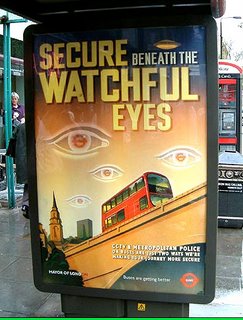Wednesday, September 06, 2006
Who's Watching?
 Who's Watching?
Who's Watching?Surveillance to 'Sousveillance'
Taipei Times
AFP , WASHINGTON Monday, Jul 25, 2005
"Had the terror suspects in London's Tube bombings chosen instead to wreak havoc in the US, it might have been weeks before the world knew what they looked like.
That is because the all-seeing network of 24-hour-a-day security cameras which blankets Britain, and which allowed police to quickly beam pictures of the suspects across the globe, simply doesn't exist in the US."
Many in the US would be willing to forfeit privacy for security. In a century where terrorism is the new Red Scare, the citizens of this country are prepared to sacrifice the rights that were the basis of the nation's existance. Though the rights of US citizens have been suspended in the past for the security interests of the nation, these are times when voyeurism is the newest vice made possible by the internet more so than ever before.
Can we trust our government to respect our privacy rights if cameras are installed in public places? If the government promises to respect our privacy, who can we trust on an individual basis to uphold this right and only spy when necessary? If the governmentcan spy, doesn't this also mean that others can use the internet to spy using the same cameras? In the furture, will there be no privacy in public places? If so, how can we be so sure that there would still be privacy around our homes? The goverment already claims the first three feet of your property. Should we allow the government to place cameras in these areas?
Almost everyone has a cellphone presently--many of which are equipped with cameras that can be linked to a computer to upload pictues. How do we prevent ourselves from being photographed, watched, when technology is quickly making it easier with each innovation? Is this not more or less what George Orwell was implying in his novel, "1984"?
Picture provided by http://images.google.com/imgres?imgurl=http://www.notbored.org/london-metro.jpg&imgrefurl=http://www.notbored.org/england-history.html&h=486&w=369&sz=59&hl=en&start=24&tbnid=D4aA8n4MLiLcWM:&tbnh=129&tbnw=98&prev=/images%3Fq%3DLondon%2Bsurveillance%26start%3D20%26ndsp%3D20%26svnum%3D10%26hl%3Den%26lr%3D%26sa%3DN
Comments:
<< Home
A good substantial post.
In London, the public seems to be quite comfortable with the trade off of security for a loss of privacy. After 9/11, Americans seem ready for the same bargain. The increased use of surveillance technology is seen as a major weapon in the war on terror. Will it eventually be used to limit political dissent? Some analysts think that it already is being used for political purposes other than hunting terrorists. The expanding definition of "terrorist" could eventually include any political activist group that calls for direct action or even civil disobedience.
Post a Comment
In London, the public seems to be quite comfortable with the trade off of security for a loss of privacy. After 9/11, Americans seem ready for the same bargain. The increased use of surveillance technology is seen as a major weapon in the war on terror. Will it eventually be used to limit political dissent? Some analysts think that it already is being used for political purposes other than hunting terrorists. The expanding definition of "terrorist" could eventually include any political activist group that calls for direct action or even civil disobedience.
<< Home
